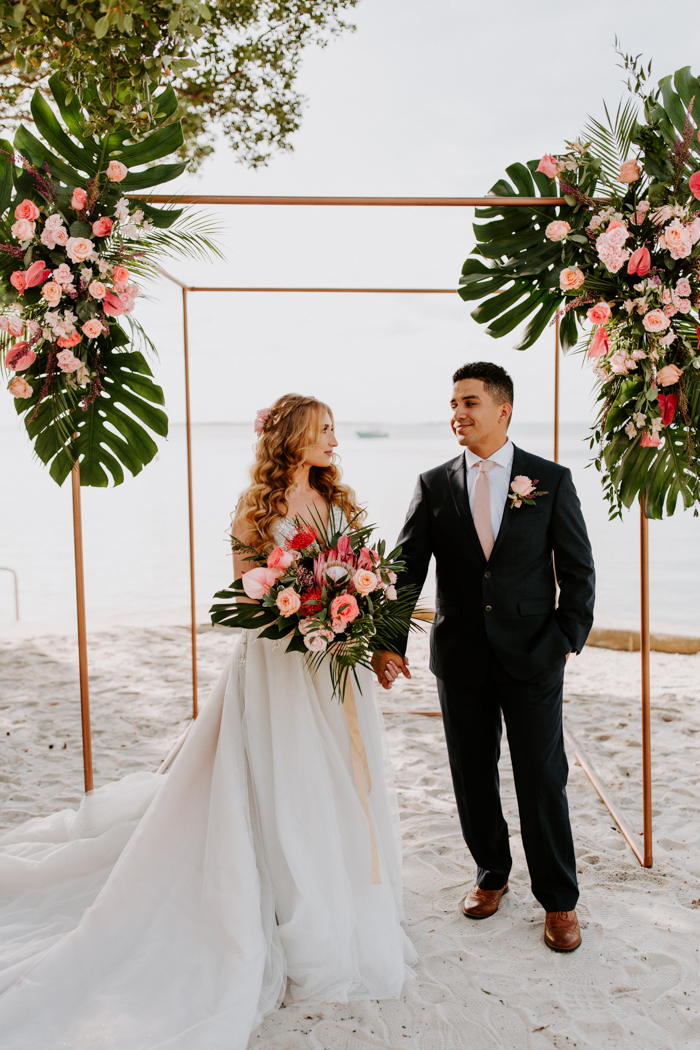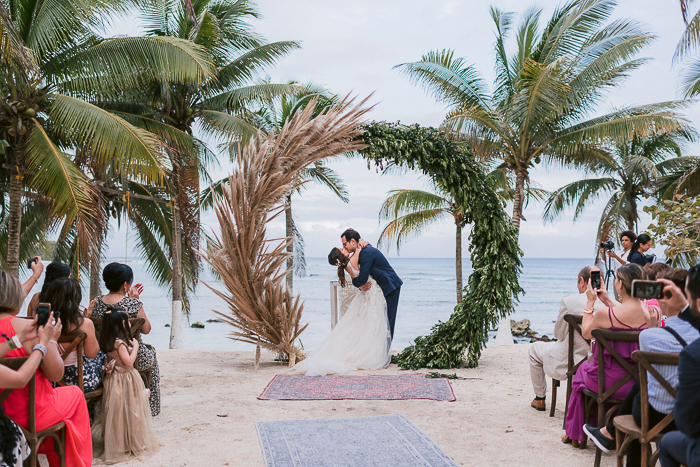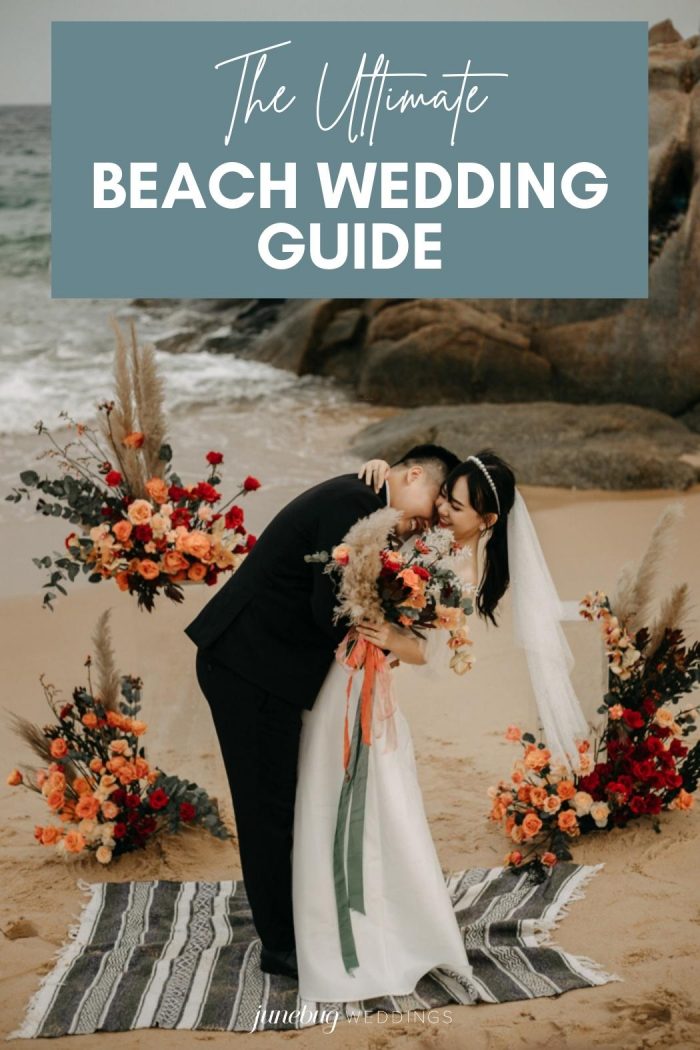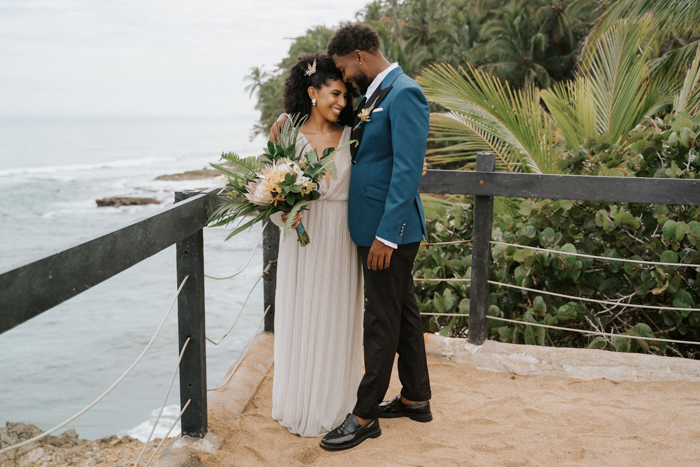With summer just around the corner, we can’t help but dream of days on the beach. We can picture it now–basking in the sunshine, waves crashing in the background, toes in the sand. There’s something undeniably magical about the ocean, so it’s no wonder that the beach is an extremely popular wedding venue. Whether you’re planning a destination wedding on a faraway island or saying “I do” on a small private stretch of shore in your hometown, there’s nothing more exciting than tying the knot on the coast.
However, planning a beach wedding still requires work. From the weather to permits to etiquette, there are a few extra steps to be mindful of during the planning process. That’s why we’re here to help you make your beach wedding dreams come true and ensure that it goes off without a hitch!
Steps For Planning A Beach Wedding
Step 1. Create A Wedding Budget
As with any wedding, creating a budget that works for you and your partner is the first–and most important–step to take. It helps you decide where your spending is allocated and is a big determining factor in your location. Luckily, using the beach tends to be cheaper than traditional venues.
If you have the money to spend on an oceanfront property, that’s always an option—it’ll also give you an address to use on your invitations. Many of these properties plan most of the wedding for you, taking the guesswork out. But this means they come with a higher price tag. If you want to save money, tying the knot right on the beach may be a better fit. When getting married on a public beach, your spending will primarily go towards permits and decor. In the long run, it can save you thousands.

Image by Emma Quinn. See more of this real wedding here.
Step 2. Pick Your Location
Beaches exist all over the world. From Hawaii to The Bahamas to Fiji, your options are endless. And of course, they’re all absolutely beautiful in their own way. When choosing the beach that’s best for you, consider destinations special to you and your significant other. Or choose a spot that you’ve always wanted to visit but haven’t gotten the chance to.
If you’ve got an open mind when it comes to the destination itself, think about what kind of venue you’re looking for. Browse hotels, Airbnbs, public beaches, and our website to find options you love. There will be great options everywhere you look, but they may not all fit your vision.
Step 3. Research The Weather And Choose A Date
When you think of a beach wedding, you most likely think of summertime–and this is typically the case. However, it’s important to research the weather for your destination. The last thing you want to do is book a cheap place because you found good rates only to discover that it’s the middle of hurricane season. The minute the hurricane hits, the whole wedding is canceled, and your guests won’t be able to make it. The same goes for the rainy season. While a little rain never hurt anyone, it’s wise to have a backup plan if you know there’s a chance of a storm.
Junebug Tip:
If you’re being budget-conscious while you’re researching locations, try to look at the shoulder seasons. Shoulder seasons are the times just before and just after peak travel season in your destination. For example, if May through July are peak travel seasons for your destination, the shoulder seasons would be April and August.

Image by Heather K Purdy. See more of this real wedding here.
Step 4. Get Necessary Permits
Unless you’re getting married on private property, you’re most likely going to need a permit to get married on the beach. Check the local town ordinances to see what’s necessary for larger events. Sound like a hassle? It’s extra work! That’s why working with a wedding planner who will take care of all of these details for you is an awesome investment.
Step 5. Have A Backup Plan For Poor Weather
Unless you know that there’s not a single chance of rain–which is highly unlikely–having a backup plan is vital. This means making a little extra room in the budget for a tent or other inside ceremony and reception options.

Image by Kartsie Photography. See more of this styled shoot here.
Wedding Etiquette for Beaches
When should you send save-the-dates?
If the beach of your choice requires travel for your guests the sooner you can notify them, the better. This gives them time to book flights, hotels, take time off work, and budget for all that travel too. Ideally, you’ll want to send these save-the-dates out at least six months in advance.
Do you need to book airfare and hotel for guests?
You are not financially responsible for your guests’ travel, accommodations, or meals during the trip. However, setting up a hotel room block beforehand will help them book their lodging will be greatly appreciated. This ensures that they’re near your venue and they’re getting the best deal possible.
We also recommend outlining the best ways to get to and from the airport, some car rental companies in the area, and water ferry services if necessary. This is especially helpful in more remote locations.
How should you tell your guests to dress?
Although beach weddings tend to offer a more laidback and casual attire for guests, the dress code for your wedding is entirely up to you. No matter what dress code you choose you should state it clearly on the invitation. In fact, putting it on your wedding website for easy access will help avoid guests asking repeatedly. You don’t want to hear complaints from your guests who show up in high heels only to sink in the sand the entire time.
If you plan to have the entire wedding–both ceremony and reception–outdoors, consider offering sunscreen, sunglasses, and flip-flops as favors. This way, they can be prepared should they forget.

Image by Cristina Civallero. See more of this real wedding here.
Planning A Beach Wedding Tips
Attire
Much like your guests’ attire, your wedding day attire is your choice. However, if you know that it’s going to be warm with plenty of sunshine, consider wearing lighter fabrics such as chiffon, tulle, or organza. If you’re wearing a suit, consider one that’s linen and lighter in color–like beige.
If you’re wearing makeup, opt for sunscreen under your foundation and waterproof mascara–although, if you’re hiring a makeup artist, they already know these tips and will ensure that you look wedding-ready throughout the day.
Decor
Beaches are truly blank slates when it comes to decor. Don’t feel pressured to go with the tropical decor if that’s not a part of your wedding vision. If you’ve always dreamed of a boho affair or a more sleek or traditional look, go for it.
The key is to be mindful of the elements. If there’s any chance of winds, forgo lightweight decor that can blow away easily. Weigh down programs before the ceremony or have an usher pass them out. Or if it’s a tropical beach with lots of scattered rain showers, be sure to use acrylic or wooden seating, as it can be wiped down after a rainstorm.
Lastly, don’t skip out on speakers. Unlike a ballroom or other indoor venue, you’re going to have a lot of background noise at a beach wedding. Use microphones during the ceremony so you don’t have to yell and keep your live music or DJ mic’d up the entire time.

Image by Henry Tieu. See more of this beach elopement here.
Beach Wedding Dining Options
If you’re looking to make your beach wedding more authentic to your destination, choose a menu that represents that. For example, if you’re tying the knot in Tulum, serve tacos, enchiladas, and margaritas. If the wedding takes place in Hawaii, you could serve pork, rice, and mai tais. Making the dining options authentic to your location will help your guests feel like they’re soaking up the culture as much as possible and get to enjoy the destination that much more.
Now that you’re ready to start planning your beach wedding, it’s time to think color palettes! We’re loving these bright and bold color palettes for the warmer months.

Image by Thien Tong Photography.
The post The Ultimate Beach Wedding Guide appeared first on .

